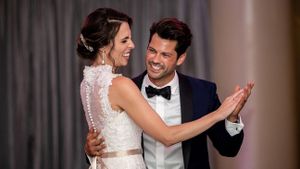Sen. Bernie Sanders expressed discontent with Robert F. Kennedy Jr.'s performance during his confirmation hearings, marking clear reservations about the nomination process. Sanders, who is known for his independent stance yet aligns with the Democratic caucus, shared his thoughts during CBS's "Face the Nation with Margaret Brennan." He stated, "I am not particularly happy" with Kennedy's performance during the hearings, underscoring his apprehensions about Kennedy's suitability for the role.
Attending the Senate Committee on Health, Education, Labor and Pensions, the hearings saw Sanders articulate his deep concerns. "Anyone who watched the hearing understands my deep concerns about Kennedy," he stressed, illustrating the gravity of his position. While acknowledging some alignment with Kennedy's views on food and obesity, Sanders could not overlook the troubling aspects of Kennedy's public health perspectives.
At the center of Sanders' critique is Kennedy's skepticism surrounding vaccines—a position he has long maintained, including controversial claims linking vaccines to autism. Despite comprehensive scientific studies debunking this theory, Kennedy’s stance continues to raise red flags for healthcare advocates. Sanders emphasized, "We have to rely on evidence-based approaches on health. Healing should not include conspiracy theories or misunderstandings about vaccines."
Evidence is on the side of the scientific community, which has repeatedly proven vaccines safe and effective, radically curbing disease incidence. Sanders’ caution against Kennedy’s vaccine stance resonates within wider public health concerns amid rising misinformation and vaccine hesitancy.
Sanders' reluctance to prematurely judge Kennedy's nomination stems partly from his position on the Senate Finance Committee, which is slated to vote on the nomination. He mentioned he would decide his vote at the appropriate time, but his expressions of concern are clear for all to see.
His skepticism was echoed by Republican Sen. Bill Cassidy, chair of the Senate HELP committee, who also conveyed uncertainty surrounding Kennedy's nomination. Such bipartisan expressions of doubt may indicate the fraught nature of the upcoming vote, scheduled for Tuesday. The confirmations for appointments like Kennedy's—and the deliberations beforehand—often serve as flashpoints for broader discussions about public health, belief, and science's role within governance.
Sen. Cassidy's involvement signifies the weight of the hearings, as both Sanders and Cassidy play pivotal roles in shaping the decision. With diverse voices voicing reservations about Kennedy's nomination, the upcoming vote will surely reflect a mix of these concerns among Senators, weighing the scales of public sentiment, scientific backing, and Kennedy's fitness for the responsibilities at hand.
Expectations for Kennedy's confirmation face several obstacles, underscored by these comments from Sanders and Cassidy. Sanders' commitment to public health principles brings to light the significance of evidence-based policymaking, particularly when it relates to vaccine mandates and broader health initiatives affecting millions. It remains to be seen how Kennedy will navigate this minefield of skepticism and public health imperatives.



